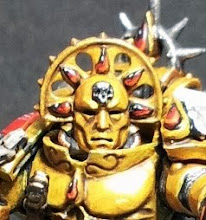An interesting conversation came up in Jap class today, but alas, it was cut short, mianly by my atrocious inability to express myself adequately in Japanese. So, as a quick break from pondering the depressing inevitabilities of the Culture War, I'd like to quickly record my thoughts on the matters discussed, partly so I can come back and see if I can say them in Japanese later, partly for the benefit of classmates bored enough to come and read my blog.
The matter of Japan's cultural idiosyncrasy came up in class, and all were at a loss to explain why Japan is so damn... well, Japanese. You know, the sheer open-mindedness, the intense focus on etiquette, the incredible work ethic, the high pressure lifestyle... stuff like that. So, me being me, I brought up the matter of Bushido. The teacher pointed out that throughout Japan's history, the warrior class had always been a teeny tiny minority, and thus were in no position to significantly affect the long-term cultural evolution of Japan. And here I knew instantly that my teacher had not read Nitobe Inazo's book. Alas, my counter argument fell flat on its face, for here I did find the limits of my Jap vocabulary. So, what follows is what I wanted to say at the time, but couldn't.
It does not matter that the vast majority of Japan's population comprised peasant farmers and craftsmen during the age of samurai. What matters is that there existed samurai to uphold the ideal of Bushido. Those who lived the ideal, however few, would live forever in the stories told of their deeds. Bushido would survive, not as a code of ethics followed to the letter by every strata of society, but as a distant ideal, practiced by heroes, real or fictitious, a faraway moral peak that everyone else aspires to. This is one way in which Bushido filters down even to the lowliest peasant, as told in much greater detail in Nitobe's book, which seems very plausible to me.
What English-speaking boy hasn't heard the tales of Arthur and his knights, then fantasized of performing great feats of valour and gallantry with sword and shield? Is there a Chinese speaker on Earth who has never heard of Guan Yu, Yue Fei or Wu Song? On the Japanese side, who in Honshu knows nothing of Uesugi Kenshin, Takeda Shingen or Chuushingura? All these stories are centuries old, and have captured enough imaginations to leave an impact on the cultural mores of the societies that birthed them. Now, in the 21st year of Heisei, there are no bushi, but the very shadow of Bushido is sufficient to keep Japan a breed apart from every other modern nation.
Bushido lives, but not in the form stipulated in Hagakure. It is manifest in various aspects of Japanese society. It is clearest, perhaps, in the spiritual aspect of Japanese martial arts, in such concepts as zanshin, rei or fudoushin. It is apparent elsewhere, in etiquette, in the respect held for learning, in their sense of pride... I see these things, and though maybe some parallels may be found in other cultures, it is the confluence of these aspects of Japanese culture that makes it uniquely Japanese, and it appears to me that these aspects all find their roots in Bushido.
This is NOT to say that Japanese culture and Bushido are one and the same! It's an easy trap to fall into, but to be sure, there are many things that are uniquely Japanese that have little to no connection with Bushido - Noh, ikebana, Kiyohime, Momotaro and a taste for raw meat, to name but a few. In bringing up Bushido, I merely hold it up as a word which best describes the single greatest factor that makes Japan Japanese.
Of course, I'm still an empiricist, and hence am very much open to the suggestion that I could be completely wrong and, as always, am most welcoming of any comments or criticisms of my observations. Now, if you'll excuse me, there's a litter box that requires my immediate attention...
Subscribe to:
Post Comments (Atom)


No comments:
Post a Comment